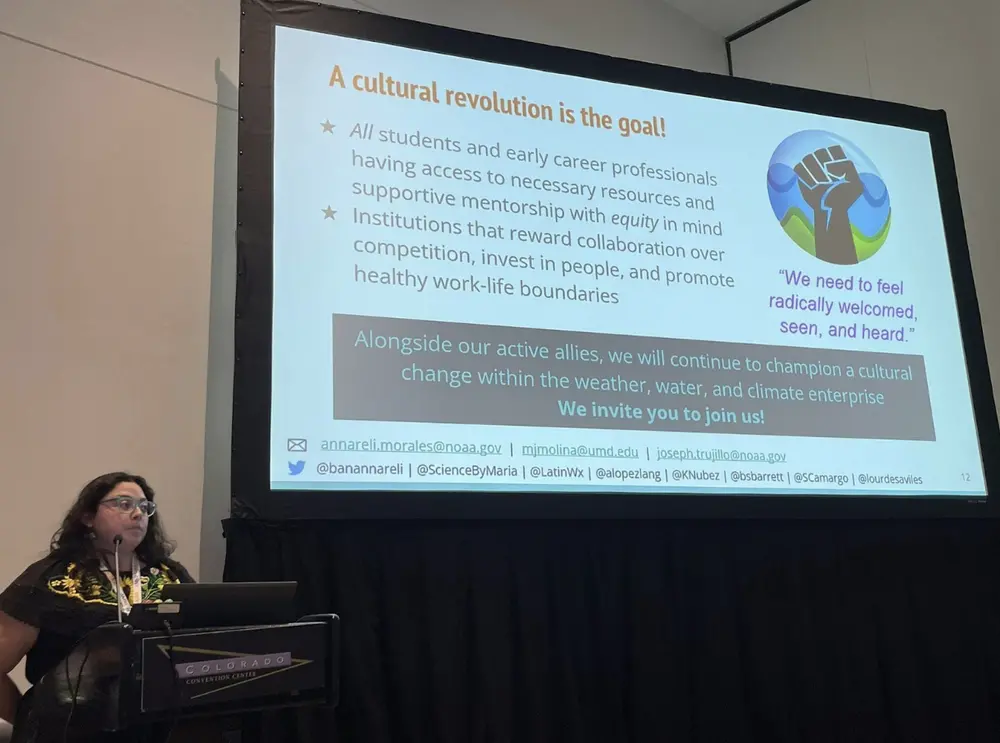
Dr. Annareli Morales was recently awarded a highly selective award by the American Meteorological Society for her distinguished research career and her efforts in promoting the Latinx community within the atmospheric sciences. Annareli grew up in Chicagoland (shoutout to Cicero) and graduated from the University of Illinois with a double major in Atmospheric Sciences and Geology in 2012. Since her time in CliMAS, Annareli earned her MS from Colorado State University and her PhD from the University of Michigan (we’ll forgive her). During her time as an NCAR Advanced Studies Program postdoctoral fellow, she supported field campaigns in Argentina, focusing on education and outreach. She also published research on engaging Hispanic and Latinx adults through cultural communication styles. Dr. Morales then worked as a research scientist with the NOAA Cooperative Institute for Research in Environmental Science, where she studied precipitation over mountains and the physical processes involved in cloud and precipitation development. Currently, she serves as the air quality policy analyst for the Weld County Department of Public Health and Environment in northern Colorado, and has been a leader in Hispanic and Latinx community engagement.
CliMAS: Congratulations on this great achievement! How does it feel to be recognized by this distinguished award?
I feel surprised, honored, and proud. It’s a wonderful recognition from the weather, water, and climate community and a reminder that I made a positive impact in atmospheric science and with my peers, since it’s not an easy task to get that nomination package submitted! It’s wonderful to know people took time from their lives to write in support of my achievements and contributions to the community.
CliMAS: Can you tell us what your current role entails? How can our students prepare for a similar position?
As an air quality policy analyst, I’m responsible for reviewing data, legislative documents, regulation proposals, and reports. I attend meetings and take detailed notes, distilling the most relevant points and getting that information to relevant staff. I gather input from inside and outside our local government and provide information and recommendations to county leadership as they make policy decisions. As a public servant in public health, I aim to cultivate partnerships to promote public health and environmental quality through the delivery of relevant, innovative, and cost-effective services. I work with state, regional, and federal agencies, elected officials, academics, and private industry representatives. I am a resource on air quality related topics for boards, staff, towns/cities, and the general public within my county. I also contribute to health equity planning and public education and outreach.
You can prepare for a similar position by attending local meetings held by city councils, county boards, and any public listening sessions hosted by local and state public health departments. This will give you an insight into what issues are being discussed. As you listen, try to connect at least one thing you hear to 1) something you’ve learned in class or have conducted research on and 2) how you could contribute to the conversation (research, data analysis, expert review of draft documents). You can also check in on proposed bills during the legislative session dealing with energy, environment, transportation, or health. What is the problem these bills are trying to solve? How is the information being presented? What are the arguments for or against the bill? What’s your perspective on the arguments? What is missing from the conversation?
CliMAS: How did your experiences at UIUC prepare you for your career?
I had lots of opportunities for hands-on field work in both my atmospheric science and geology courses, which prepared me for field work and observing my environment to spark new science questions. Many of my peers and colleagues became leaders in atmospheric science, so having those connections helped expand my network and have access to expertise in all subfields of atmospheric science, like severe weather, tropical meteorology, insurance, forecasting, remote sensing, cloud microphysics, atmospheric chemistry, mesoscale meteorology, numerical modeling, and so many others.
CliMAS: If you had one thing to tell our undergraduate students about their future, what would it be?
You have options. From air quality to energy efficiency to urban planning, your expertise is applicable beyond the walls of a research lab or university. As I transitioned into the public sector, I’ve been able to apply nearly every skill I gained in college and grad school to my job. You are not a failure if you decide you don’t want to do research or be a professor. It’s normal to switch careers! Try as many as you want until you find the best fit for your skills and passion.